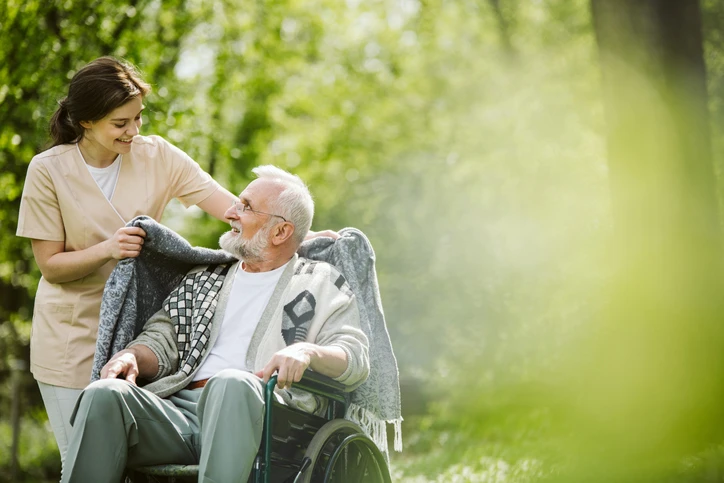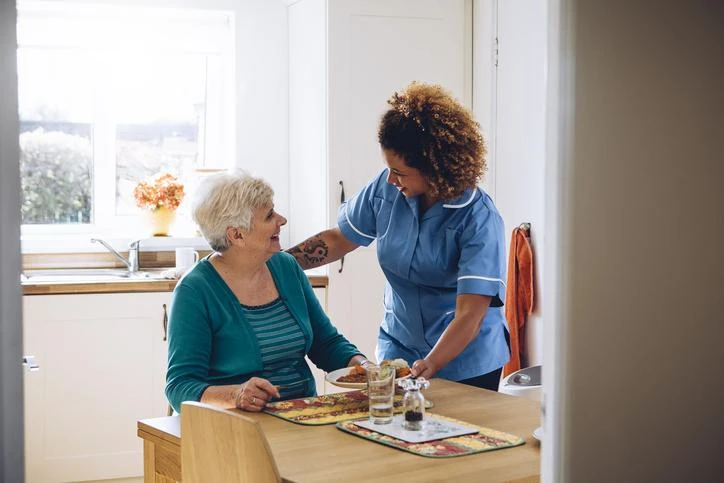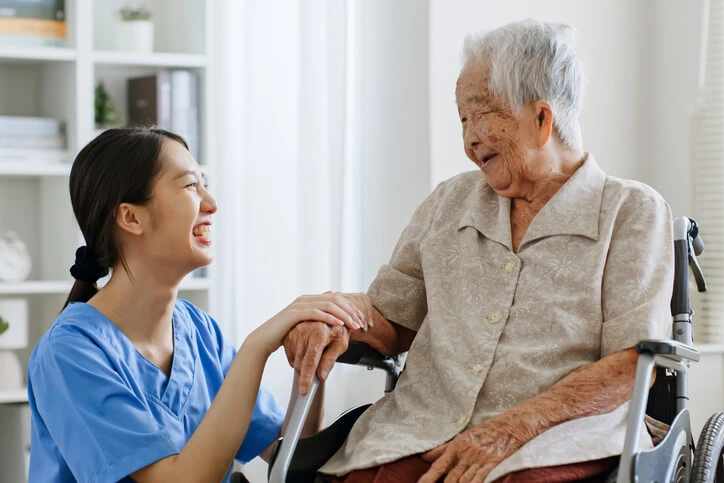Table of Contents
You’ve probably been in situations where someone relied on you— an aging parent who needed help through the day, a sick child you cared for, or a neighbour with limited mobility who needed support. If stepping in felt instinctive, you’re a perfect fit for the role of personal care aide.
Personal care aides (PCAs), also known as continuing care assistants (CCA), health care aides or personal care attendants, help individuals with daily routines they can no longer manage on their own. This type of support is needed in hospitals, care homes, assisted living centres, and private residences across Canada.
So, what does a typical day look like? What kind of personality suits this work? And how do you get started? This article breaks it down– giving you a closer look at the job, the people you’ll support, and how SBC College’s diploma program can help you build a career in caregiving.
Listen to: Personal Care Aide: Your Guide to Daily Duties & Responsibilities
A Day in the Life: Personal Care Aide Daily Duties
Daily duties as a personal care aide depend on where you work and who you’re supporting. In private homes, you may assist one client for most of the day. In long-term care facilities, you might support several people during different shifts. While routines vary, here are the personal care aide daily duties you’ll typically carry out:
Offer Companionship and Emotional Support
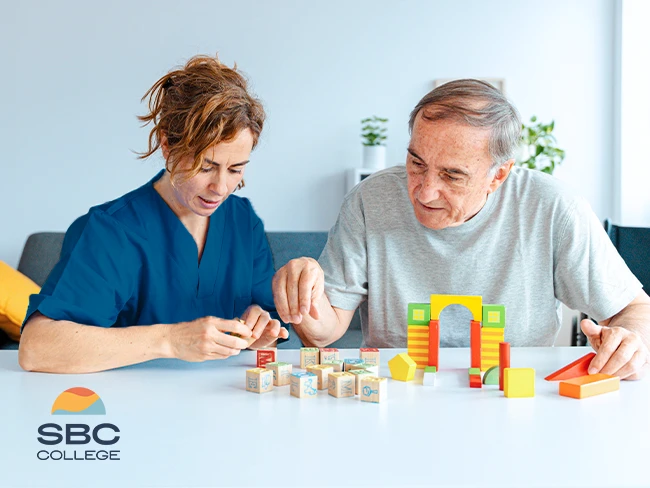
In many cases, clients spend long hours alone in long-term care facilities or private home settings. Your presence – whether it’s through conversation, sharing a quiet meal, or simply being nearby – can offer comfort and help them feel acknowledged. These moments can ease anxiety, particularly for those dealing with memory loss or confusion.
For most personal care aides, this is also one of the most fulfilling parts of the job. It’s an opportunity to connect, provide reassurance, and become someone clients trust and welcome into their daily lives.
What’s expected from you: Emotional support caregiving calls for attentiveness and patience. You will need to be trained to recognize emotional changes, respond to signs of withdrawal or confusion, and communicate effectively with clients who have cognitive or memory-related conditions.
Provide Mobility Support
Mobility support is part of most care plans. You may help someone stand, move to a chair, or use a walker safely. Some clients may need a hand walking to meals or appointments, while others may need positioning support if they spend most of the day in bed or seated.
What’s expected from you: You need to be skilled in safe lifting, proper use of mobility aids, and assisting elderly mobility in a way that protects both you and the person receiving care. A Transferring, Lifting, and Repositioning (TLR) certificate is often required before starting work in long-term or private home settings.
Support Nutritional Needs
You may be responsible for preparing meals, setting up food trays, or assisting with feeding. Some clients follow special diets because of diabetes, allergies, or swallowing issues. It’s also part of your job to make sure the right food and drinks are accessible, keep an eye on appetite, and share any concerns with the care team or family.
What’s expected from you: You need to be trained in nutritional support, food safety, meal planning, and fluid intake. This includes knowing when to involve a dietitian and how to support safe, consistent mealtimes.
Ensure Client Safety and Maintain a Safe Environment
You’ll be responsible for noticing things others might overlook. A spill on the floor. A client who seems quieter than usual. A small change in how someone walks or responds. A potential fire hazard, like a blocked exit or an overheated appliance. You may also need to recognize signs of abuse affecting clients or staff and report any concerns. Picking up on these details helps prevent accidents, flag issues early, and contribute to a safer care environment.
What’s expected from you: You need to be skilled with client safety caregiving, including how to recognize signs of illness, monitor changes in breathing or skin, follow safety procedures, and report concerns related to falls, equipment use, or possible abuse.
Assist with Personal Hygiene
You’ll support clients with personal care tasks they may no longer be able to do safely or independently. This includes assisting with personal hygiene routines such as bathing, grooming, dressing, and using the toilet. You will follow each client’s care plan, approaching each interaction with their comfort in mind.
What’s expected from you: Be trained in standard practices for infection control during personal care. These include proper handwashing, knowing when to perform hand hygiene, using personal protective equipment correctly, and handling cleaning supplies safely.
Every action you take contributes to your client’s health, safety, and ability to manage their day.
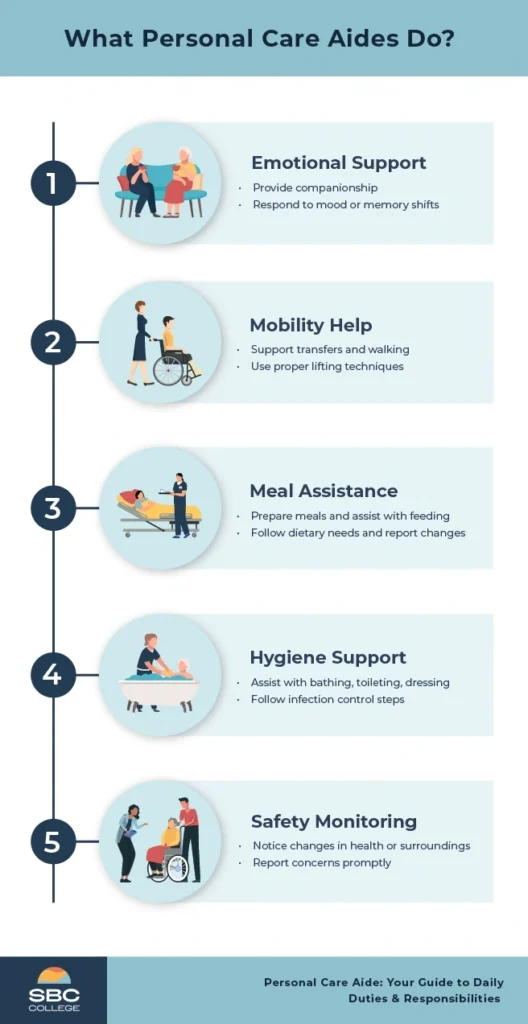
Is a Personal Care Aide Career Right for You?
Are you the kind of person who brings a calm presence and offers help to those who need it? Do you want to make a difference in someone’s day by helping with care activities like dressing, bathing, or moving around? Do you easily pick up on small changes in someone’s mood or routine?
If you’re nodding along, you likely have the natural instincts suited to a personal care aide career. Along with these qualities, becoming a PCA also means developing specific skills that help you deliver the best possible care to your clients.
Communication and Interpersonal Skills
Your job as a PCA or CCA will involve constant interaction with each person in your care. You’ll explain routines, listen carefully, and respond in ways that make them feel heard.
Communication in caregiving goes beyond words. It includes your tone, body language, and the ability to remain calm and assertive when someone is upset or confused.
You’ll also need to recognize and work through communication barriers. These may include hearing difficulties, speech challenges, memory loss, or emotional distress. Being able to adjust your approach by simplifying instructions, repeating information, or using nonverbal cues helps you connect more effectively.
These skills help build strong relationships and help create a care environment where clients feel safe and understood.
Problem-Solving and Adaptability
You might find a client feeling unwell or confused or refusing care. Being able to notice what’s changed, stay calm, and decide on the next steps is part of the job. Sharon D., Personal Care Aide Program instructor at SBC College, shares:
“A missed meal, a different tone of voice, or hesitation when standing can be early signs that something is wrong. Noticing those changes helps you respond before the situation becomes more serious.”
Problem solving in caregiving helps you decide when to adjust your approach or ask for help, so the client receives the support they need at the right time.
Transferring, Lifting, and Repositioning Techniques
You’ll often assist with repositioning, mobility, and personal care, which means using your body carefully and efficiently. Rather than relying on strength, caregiving requires learning proper techniques to move and position clients with minimal physical effort.
Sharon D. comments on the importance of learning proper movement and positioning skills:
“When you learn how to move and support clients safely, you lower the risk of injury for both yourself and the person in your care. It’s one of the most important skills to get right because it affects how clients feel during your care.”
Knowing how to move someone safely is among the essential skills every personal care aide need from day one.
These tasks take empathy, awareness, and practical skills and they’re all part of what you’ll learn in a quality training program. If you’re ready to build these capabilities and prepare for hands-on caregiving, training to be a personal care aide could be the right next step.
Launch Your Career: SBC College PCA Program Benefits
The SBC College PCA Program prepares you for an entry-level healthcare career, supporting clients in both long-term care and private home settings. You’ll build practical skills in hygiene, mobility, nutrition, and observation that are essential for providing daily care support.
As part of your training, you’ll learn how to take vital signs, reposition clients, assist with hygiene and meals, and share updates with the care team. You’ll also develop the ability to support clients living with dementia and respond to safety concerns in professional care settings.
Sharon D., Personal Care Aide Program instructor, adds:
“By the time students graduate, they know how to document changes, follow workplace protocols, and respond within their scope when clients need extra attention or support.”
To reinforce what you’ve learned, the program includes practicum placements in both long-term care and private home settings. These experiences help you apply your training and get a better sense of the setting you enjoy working in. Students who meet expectations during this stage are offered a paid practicum while completing the rest of the program.
To get started, contact an admissions advisor today.
Frequently Asked Questions (FAQs)
If you’re considering becoming a personal care aide, you likely have questions about what the job involves, how long training takes, and what qualifications employers look for. Here are answers to some of the most common personal care aide questions.
What qualifications do you need to become a personal care aide?
To work as a personal care aide, you’ll need to complete a diploma program that covers hygiene care, mobility support, nutrition, infection prevention, and client observation. Most employers also require certifications in CPR, Food Safety, and Transferring, Lifting, and Repositioning (TLR), as these are standard across many care giving settings in Canada.
How long does it take to complete a personal care aide program?
SBC College’s Personal Care Aide Diploma Program takes about 10 months to complete with full-time study. It is a hybrid program, meaning it includes both in-class and online learning. You’ll also take part in hands-on practicums, giving you the chance to apply your skills and build caregiving experience before graduating.
What is the difference between a personal care aide and a health care aide?
In Canada, personal care aide and health care aide refer to similar work; helping individuals with daily needs like hygiene, mobility, and meals. The term ‘health care aide’ is more commonly used in provinces like Alberta, where this role can also be called ‘personal support worker’, particularly in publicly funded care settings. Personal care aide, also called continuing care assistant (CCA), is often used in provinces without a standardized HCA designation. Regardless of the title, the training and responsibilities are largely the same.
What skills are essential for success as a personal care aide?
Success in this role relies on good communication, emotional awareness, and physical stamina. You also need practical skills in hygiene care, mobility assistance, safe food handling, and recognizing health or safety concerns. Being observant and adaptable makes a big difference in how well you respond to clients’ changing needs.
What are the daily duties of a personal care aide?
Personal care aides assist with hygiene, meals, mobility, and safety monitoring. They may help clients get dressed, reposition in bed, prepare food, support gentle activities, and watch for changes in health or mood. They also help keep living areas safe and clean.
Can I become a personal care aide without prior experience in healthcare?
Yes. SBC College’s Personal Care Aide Program is designed for individuals with no previous healthcare experience. You’ll learn essential skills in hygiene care, infection prevention, communication, and client support. The program also includes practicum placements, giving you hands-on experience in both long-term care facilities and private home settings before entering the workforce.




